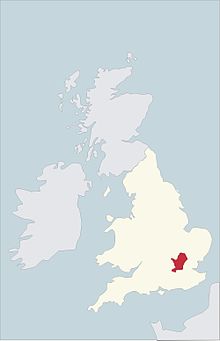Diocese of Westminster Dioecesis Vestmonasteriensis | |
|---|---|
 Coat of arms | |
| Location | |
| Country | England |
| Territory | Greater London boroughs north of the Thames and west of Waltham Forest and Newham, plus the City of London, the districts of Staines and Sunbury-on-Thames, and the county of Hertfordshire. |
| Ecclesiastical province | Westminster |
| Deaneries | 23 |
| Statistics | |
| Area | 3,634 km2 (1,403 sq mi) |
| Population - Total - Catholics | (as of 2017) 4,914,400 439,740 (8.9%) |
| Parishes | 214 |
| Information | |
| Denomination | Catholic |
| Sui iuris church | Latin Church |
| Rite | Roman Rite |
| Established | 29 September 1850 |
| Cathedral | Westminster Cathedral |
| Secular priests | 366 |
| Current leadership | |
| Pope | Francis |
| Archbishop | Vincent Nichols |
| Auxiliary Bishops | |
| Vicar General | Martin Hayes |
| Map | |
 | |
| Website | |
| rcdow.org.uk | |
The Diocese of Westminster (Latin: Dioecesis Vestmonasteriensis) is a Latin archdiocese[1] of the Catholic Church in England. The diocese consists of most of London north of the River Thames and west of the River Lea, the borough of Spelthorne (in Surrey), and the county of Hertfordshire, which lies immediately to London's north.
The diocese is led by the Archbishop of Westminster, who serves as pastor of the mother church, Westminster Cathedral, as well as the metropolitan bishop of the ecclesiastical Province of Westminster. Since the re-establishment of the English Catholic dioceses in 1850, each Archbishop of Westminster—including the incumbent, Cardinal Vincent Gerard Nichols—has been created a cardinal by the Pope in consistory, often as the only cardinal in England, and is now the 43rd of English cardinals since the 12th century. It is also customary for the Archbishop of Westminster to be elected President of the Catholic Bishops' Conference of England and Wales providing a degree of a formal direction for the other English bishops and archbishops. Though not formally a primate, he has special privileges conferred by the papal bull Si qua est.[2] The Archbishop of Westminster has not been granted the title of Primate of England and Wales, which is sometimes applied to him, but his position has been described as that of "chief metropolitan" of the Catholic Church in England and Wales and as "similar to" that of the Archbishop of Canterbury in the Church of England (as the metropolitan bishop of the Province of Canterbury).[3] The diocese is one of the smallest dioceses in England and Wales in geographical area, but the largest in terms of Catholic population and priests.[4]
The suffragan sees of Westminster are the dioceses of Brentwood, East Anglia, Northampton, and Nottingham.
- ^ "Our Diocese ..." Diocese of Westminster official website. Diocese of Westminster. Retrieved 14 June 2017.
- ^ Herbermann, Charles, ed. (1913). . Catholic Encyclopedia. New York: Robert Appleton Company.
- ^ "As ordinary of the Diocese of Westminster his jurisdiction extends over much the same area as that of the Bishop of London. As chief metropolitan, he occupies a position similar to that of the Archbishop of Canterbury, Primate of All England" (Herbermann, Charles, ed. (1913). . Catholic Encyclopedia. New York: Robert Appleton Company.). (At the bottom of the article, the first source listed is "Archives of the Diocese of Westminster.) Retrieved 2017-06-14. "By the grant in the Apostolic Constitution of 'certain new distinctions of preeminence', for the preservation of unity in government and policy, to the archbishop of Westminster for the time being, comprised under the following three heads: He will be permanent chairman of the meetings of the Bishops of all England and Wales, and for this reason it will be for him to summon these meetings and to preside over them, according to the rules in force in Italy and elsewhere. (2) He will take rank above the other two Archbishops, and will throughout all England and Wales enjoy the privilege of wearing the Pallium, of occupying the throne, and of having the cross borne before him. (3) Lastly, in all dealings with the Supreme Civil Authority, he will in his person represent the entire Episcopate of England and Wales. Always, however, he is to take the opinion of all the Bishops, and to be guided by the votes of the major part of them'. Thus, though the Archbishop of Westminster was vested with more powers and privileges than primates usually enjoy, unity of action has been safeguarded" (Herbermann, Charles, ed. (1913). . Catholic Encyclopedia. New York: Robert Appleton Company.).
- ^ "Our Diocese..." Diocese of Westminster.